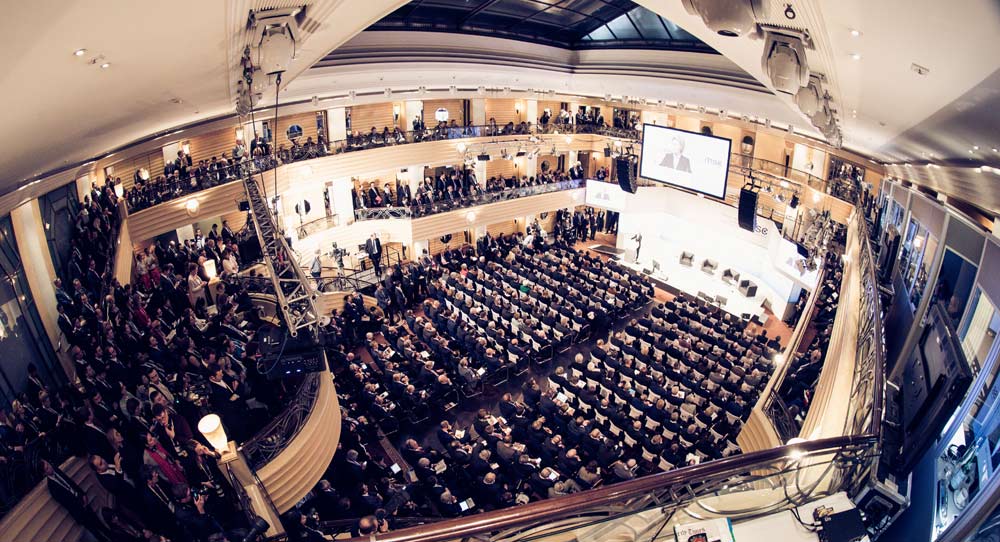Every year, a raft of world leaders and their raft of minders, not to mention the plethora of defense experts, ambassadors (current and former), ministers, and top European and American officials, squash into the Bayerischer Hof Hotel.
This elegant venue, more accustomed to visitors seeking calm and luxury, has become the fixed locale for the annual Munich Security Conference (MSC). Here, every February, invited guests hope to gain insights into the complexities facing the West, in particular the state of the transatlantic relationship.
But after reading the Munich Security Report 2018: To the Brink and Back—which is supported by great graphics and stats—strategists who want to garner some sense about what is happening to the West’s predominance since 1945 and after the end of the Cold War may be disappointed.
Yes, the report dwells on the rise of China, the hopes for Africa, cybersecurity, the endless rifts in Europe, (of course) the United States under the Trump administration, and Russia’s direction. But what is missing is complexity. The West, however it is defined, is undergoing a change so fundamental that clinging to old narratives about the health or sickness of the transatlantic relationship is no longer applicable.
This is because digitization is changing everything—from politics and political representation to crucial questions concerning influence and stability, power, democratic governance, and transparency.
In essence, digitization is challenging the old parameters of the transatlantic relationship and the West’s long dominance of the narrative. That narrative assumed that the post-1945 order would be the permanent platform for values, for pragmatism, for toleration, and for inviolable borders. That narrative is now up for grabs. It’s not just because of Russia’s annexation of Crimea in 2014 and Europe’s selfish attitude to refugees—two things that punctured those assumptions. Digitization is becoming the biggest game-changer.
How it is used by democracies, autocracies, and nonstate actors is becoming the new norm. In that sense, it’s time the West adjusted its narrative. That means finding a new language to deal with the demise of the post-1945 period and its aftermath, the post-Cold War era. It won’t be easy, but it’s necessary if the West is to protect its values and its democratic structures, in addition to remaining a beacon for those struggling for human rights and freedom.
Yet it seems that the underlying assumption of the MSC report is that the old narrative of the transatlantic relationship can, for instance, coexist with the rise of China, deal with cybersecurity, and address Russia’s persistent goal of dividing the West. This assumption is based on nostalgia or wishful thinking that post-1945 generations of Europeans and Americans cling to.
The idea that the West is based on values of tolerance and pragmatism, democracy and openness, is more relevant than ever. But the West is being challenged by the extraordinary speed and impact of digitization and technology. This includes artificial intelligence, vast flow of opinions and data, false news, and disinformation.
Combined, these create competing narratives that have a following and an influence that contest the traditional structures of Western democracies. China is in the lead when it comes to recognizing how to channel and control digitization. It has erected firewalls and built sophisticated surveillance systems to spy on and control its own people.
In Egypt, the social media that had been used by civil society activists to mobilize opposition to the former president, Hosni Mubarak, has been turned into a tool by President Abdel Fattah al-Sisi to clamp down on any dissent.
The West, meanwhile, has been far too slow to use digitization to strengthen its democracies and to protect and project its values.
The values of tolerance and openness are what characterize the West. But look at how the EU and NATO, the bedrocks of the West, deal with the chiseling away of values among their own members. NATO has been all but silent about criticizing the consistent erosion of the rule of law in Turkey, while the EU seems incapable or reluctant to defend its own values in Hungary and Poland, not to mention the persistent corruption in Romania.
There is no reason why Western governments cannot harness digitization to promote these values through a more creative use of social media and channeling of civil society. If anything, digitization should provide democracies with the ideal means to deepen and defend their values. They did it after 1945. Now, they have to move beyond old assumptions and nostalgia.






.jpg)